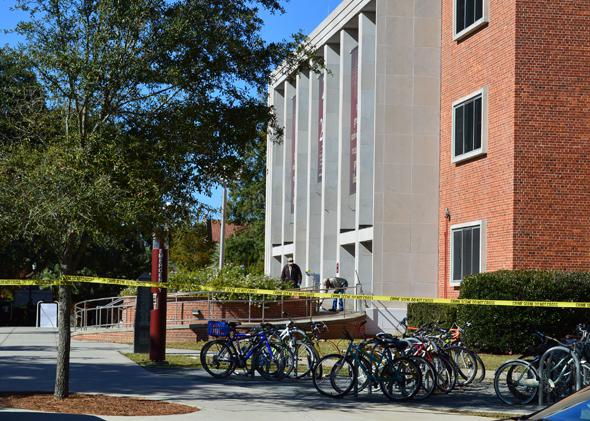A shooting at Florida State University on Thursday left three students wounded and the gunman dead. Witnesses describe a terrifying scene at a crowded library on campus just after midnight. It appears that campus police responded quickly and killed the shooter in a barrage of gunfire shortly after the incident was reported. Gun rights activists will undoubtedly praise the fast actions of the good guys with guns and use the episode as a shining example of a system that works, of carnage interrupted.
But what about the first victims of a mass shooting?
Oblivious to the impending danger, many first victims have no time to react before the trigger is pulled. Bullets pierce their bodies as bystanders flee and terror takes over. If they are not immediately killed, they must suffer alone—in agonizing pain—while the shooter continues his rampage and first responders take action.
The gun lobby acknowledges the problem of mass-shooting incidents in the United States. Its solution calls for arming more people who could potentially stop a shooter and for rapid-response training focused on minimizing casualties. This is part of an increasingly pervasive, insidious gun culture that accepts mass shootings as inevitable. But by this logic, the first victims—friends, loved ones, children—are expendable. The first victims of a mass shooting are a mangled human sacrifice on the altar of Second Amendment rights.
Until a shooter pulls the trigger to begin his slaughter, he is merely a guy with a gun. The gun lobby insists that the government should allow people to carry firearms into all public places. (Gun advocates continued to push for expanded open-carry legislation the morning after the Tallahassee shooting.) After all, who are we to judge a man simply because he is proudly displaying a gun by his side? In this world, the first victim is merely an alarm for others to respond.
The National Rifle Association does everything it can to focus on using guns to solve gun violence. In 2007, Ted Nugent, who serves on the NRA board of directors, penned an op-ed in which he blamed a gun-free campus policy for the deaths of 32 unarmed students at my alma mater, Virginia Tech. After 20 children and six adults were murdered at Sandy Hook, the NRA suggested training and arming teachers as the solution. After the Navy Yard shooting in Washington, D.C., spokesman Wayne LaPierre relied again on the “good guys with guns” mantra.
The NRA Twitter feed so far makes no mention of the shooting at FSU, which occurred between the time they tweeted their “#gunoftheday” and the time they tweeted an alert about Gabby Giffords’ most recent call for a debate about guns. The Giffords story also shows up at the top of the pro-gun organization’s news site.
The fate of gun control rests largely with the pro-gun GOP, fresh off of a landslide midterm election victory. When the first significant gun-control legislation in years came up for a vote in the months following Sandy Hook, the Senate was not able to gain the 60 votes needed to avoid a Republican filibuster. In July, potential GOP presidential candidate Chris Christie vetoed a New Jersey bill to restrict high-capacity magazines in that state. Florida is well known for its gun-friendly legislation, including the controversial “stand your ground” law. Guns & Ammo recently ranked Florida as the 10th best state for gun owners, proudly heralding it as the “Gunshine State.”
Prevention of gun violence is no longer part of the equation. At this point, the expanded background checks proposed after Sandy Hook are very unlikely. Online sales, gun-show loopholes, and new gun-friendly legislation make it easy for individuals to purchase guns without any background checks whatsoever. The NRA says prohibiting online person-to-person sales “is a direct attack on the First and Second Amendments.” Expanded mental-health legislation focusing on gun ownership is unlikely to surface, either. Pro-gun groups in Colorado actively opposed legislation to expand mental-health resources for gun-owning individuals in crisis.
With reasonable preventative measures off the table, gun advocates are making it easy for violent or unstable individuals to access and use firearms in acts of mass violence. In arming bystanders as a solution, the NRA and other pro-gun groups are simply telling first victims and their loved ones that their lives are worth less than gun owners having to consent to a basic background check. For the rest of the victims, well, you had a chance to arm yourselves.
